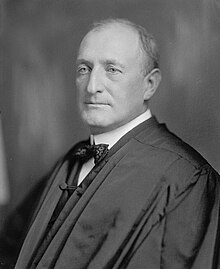
Back جيمس كلارك ماك رينولدز Arabic جيمس كلارك ماك رينولدز ARZ جیمز کلارک مکرینولدز AZB James C. McReynolds German James Clark McReynolds French ג'יימס קלארק מק'ריינולדס HE James Clark McReynolds ID James Clark McReynolds Italian James Clark McReynolds Swedish 詹姆斯·克拉克·麦克雷诺兹 Chinese
James McReynolds | |
|---|---|
 | |
| Associate Justice of the Supreme Court of the United States | |
| In office October 12, 1914 – January 31, 1941[1] | |
| Nominated by | Woodrow Wilson |
| Preceded by | Horace Harmon Lurton |
| Succeeded by | James F. Byrnes |
| 48th United States Attorney General | |
| In office March 15, 1913 – August 29, 1914 | |
| President | Woodrow Wilson |
| Preceded by | George Wickersham |
| Succeeded by | Thomas Gregory |
| Personal details | |
| Born | James Clark McReynolds February 3, 1862 Elkton, Kentucky, U.S. |
| Died | August 24, 1946 (aged 84) Washington, D.C., U.S. |
| Political party | Democratic |
| Education | |
James Clark McReynolds (February 3, 1862 – August 24, 1946) was an American lawyer and judge from Tennessee who served as United States Attorney General under President Woodrow Wilson and as an associate justice of the Supreme Court of the United States. He served on the Court from 1914 to his retirement in 1941. McReynolds is best known today for his sustained opposition to the domestic programs of President Franklin D. Roosevelt and his personality, which was widely viewed negatively and included documented elements of overt antisemitism and racism.[2][3]
Born in Elkton, Kentucky, McReynolds practiced law in Tennessee after graduating from the University of Virginia School of Law. He served as the U.S. Assistant Attorney General during President Theodore Roosevelt's administration and became well known for his skill in antitrust cases. After Wilson took office in 1913, he appointed McReynolds as his administration's first attorney general. Wilson nominated McReynolds to the Supreme Court in 1914 to fill the vacancy caused by Associate Justice Horace Harmon Lurton's death.
In his 26 years on the bench, McReynolds wrote 506 majority opinions for the Court and 157 dissents, 93 of which were against the New Deal. He was part of the "Four Horsemen" bloc of conservative justices who frequently voted to strike down New Deal programs. He assumed senior status in 1941 and was succeeded by James F. Byrnes. During his Supreme Court tenure, McReynolds wrote the majority opinion in cases such as Meyer v. Nebraska, United States v. Miller, Adams v. Tanner, and Pierce v. Society of Sisters. Due to his temperament, bigotry, and his opposition to the domestic programs of the FDR administration, McReynolds is sometimes included on lists of the worst Supreme Court justices.[4]
- ^ "Justices 1789 to Present". Washington, D.C.: Supreme Court of the United States. Retrieved February 15, 2022.
- ^ Peppers, Todd C. (May 14, 2021). "Cancelling Justice? The Case of James Clark McReynolds". Richmond Public Interest Law Review. 24 (2): 59–77, esp. 65f. Retrieved January 27, 2022. See also this alternative link to the full paper, and the extensive quoted content under Further reading.
- ^ Fox, John (author) (2007). "Supreme Court History / Capitalism and Conflict". Biographies of the Robes: James Clark McReynolds (online support materials, TV series). New York: Educational Broadcasting Corporation. WNET-Thirteen.org. Archived from the original on April 24, 2011. Retrieved January 27, 2022. See also the four-part WNET-Thirteen.org video series to which these materials are attached, Brunius, Brian (series producer); Lennon, Thomas (director); and so forth (2007). The Supreme Court. New York. Educational Broadcasting Corporation. WNET-Thirteen.org. Retrieved January 27, 2022.
- ^ Millhiser, Ian (24 March 2015). "The Five Worst Supreme Court Justices In American History, Ranked". ThinkProgress.